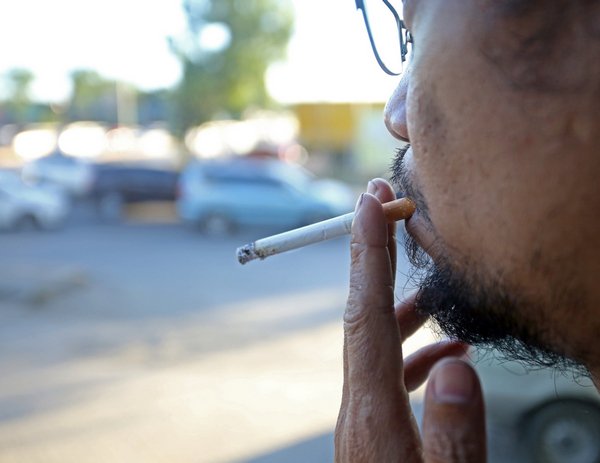Cebu vendors on tobacco sin tax hike: If demand is there, then we’ll still sell cigarettes

President Rodrigo Duterte signed on Thursday (July 24) the Republic Act 11346, a law that would increase further the excise tax imposed on tobacco products. / file photo
CEBU CITY, Philippines — As long as there’s a demand, we will continue to sell cigarettes.
These were the common answers of the Cebuano vendors despite the upcoming sharp increase of the cigarette prices in the country.
Rhona Mae Casquejo, 28, a sari-sari owner along Kaohsiung Street, Mabolo in Cebu City, said that she would continue to include and sell cigarettes in her sari-sari store as long as there would still be customers who would purchase it.
“As long as naay mamalit, mamaligya mi. Pero kung i-duso gyud ni Duterte nga i-ban gyud ang sigarilyo sa mga tindahan. Kana mapugos gyud mi nga di na maninda,” Casquejo said.
(As long as there are customers who buy it, we will sell it. However, if President Duterte pushes to ban the selling of cigarettes in stores. That’s the time we will stop selling it [cigarettes].)
Read more: BREAKING: Duterte signs higher sin tax for tobacco
Effective on January 1, 2020, cigarettes would be more expensive by at least P10 after President Rodrigo Duterte signed on Thursday, July 26, the Republic Act 11346, a law that would increase further the excise tax imposed on tobacco products.
The new law would also raise the excise tax on cigarettes to P50 per pack in 2021, P55 per pack in January 2022, and P60 per pack starting January 1, 2023.
No effect
However, Casquejo said the implementation of the new law might not affect her daily earnings, which she said would be between P2,400 and P3,000.
Casquejo said that despite President Duterte signing into law the first package of the government’s tax reform program two years ago, her daily earnings in cigarettes had not really been affected.
“Mao ra man gihapon. Nimahal ang sigarilyo pero amo raman gihapon tubuan ang among pagbaligya unya naa man gihapo’y mopalit. Same ra gihapon wa ni-ingun nga nidako or nigamay.
(It’s still the same. The cigarette became expensive, but we put profit when we sell it and fortunately there are customers who still buy it. Our earnings are the same because of there is still demand for cigarettes)
It’s the same for others.
Marilyn Mahayahay, 48, who owns a small stall along A. Soriano Avenue in Cebu City, also said that she had no plan to stop selling cigarettes as long as there’s a demand.
“Naa man gyu’y moundang nuon pero mas daghan pa gyud ang mopalit oy. Kay lisud ma na nila biyaan dayun.”
(There are those who would stop, but there are still many who would buy cigarettes because they would find it hard to stop smoking cigarettes.)
Mahayahay usually earns P800 every day from selling some goods such candies, junkfoods, and hot drinks.
She added that her earnings from selling cigarettes were bigger than other goods which had usually generated at least P500 a day.
“Kasagaran gyud [mamalit] sigarilyo unya paris candy then buntag ug gabie kay kapi,” she said.
(Usually, my customers buy cigarettes then next is candy. In the morning and evening, they buy coffee or hot drinks)
Smoker’s view
Meanwhile, the rise of the tobacco’s excise tax next year would affect a lot of tobacco users nationwide.
One of them is Ricky Alampay, 32, from Barangay Guadalupe in Cebu City, who planned to cut down on cigarette use or to stop smoking cigarettes at all.
Alampay, who has been smoking cigarettes for almost 10 years, said that he could barely afford to buy a cigarette now because of its high price.
“Sa una, mohurot kog usa ka kaha og tunga sa usa ka-adlaw, so karun is 5 sticks na lang (every day) Kay barato pa man to sa una unya karun medyo mahal,” he said.
(Before, I can consume one and a half pack of cigarettes daily. Now, I have reduced it to 5 sticks daily because it has become more expensive than before.)
He added that these price changes might stop him from smoking cigarettes.
“Mao na na ang giingun nga mo-undang na gyud ta mo-smoke gyud. Di naman ta ka-afford og sigarilyo ato nalang na ipalit og pagkaon.”
(This is probably the time to really stop smoking. We cannot afford to buy some cigarettes anymore. Instead of buying some of it, it’s better to buy some food.)
The further increase in tobacco excise tax is part of the Duterte administration’s tax reform package 2-plus of the Comprehensive Tax Program (CTRP) which aims ‘to protect to health of the Filipino people and to maintain a broader fiscal space to support the implementation of the Universal Health Care Act.’/dbs
Disclaimer: The comments uploaded on this site do not necessarily represent or reflect the views of management and owner of Cebudailynews. We reserve the right to exclude comments that we deem to be inconsistent with our editorial standards.
